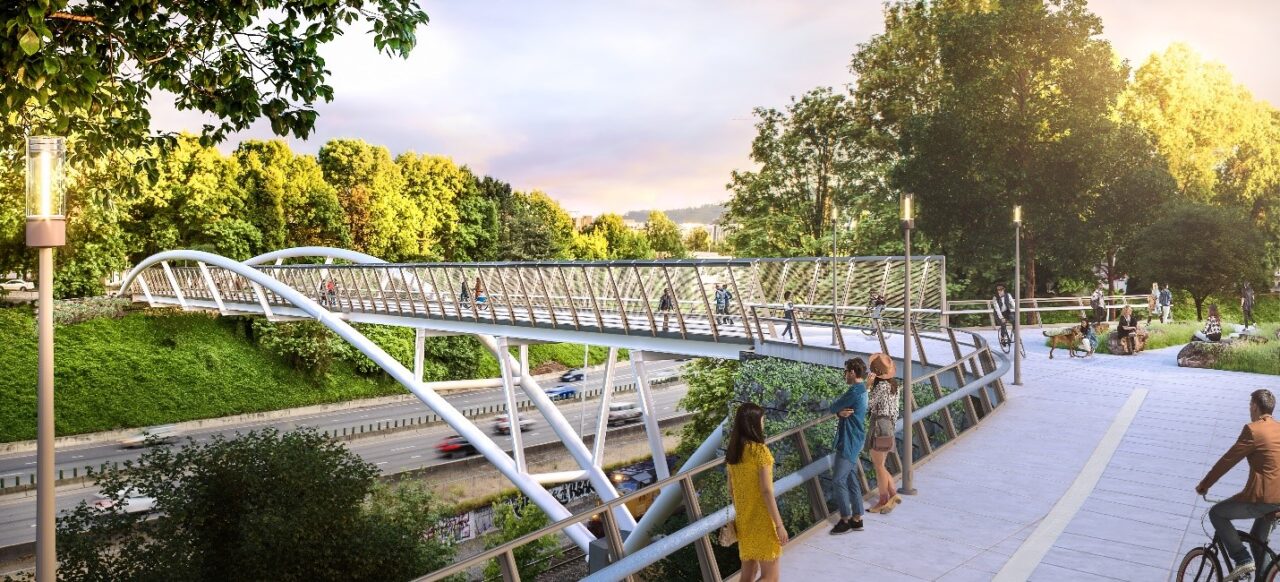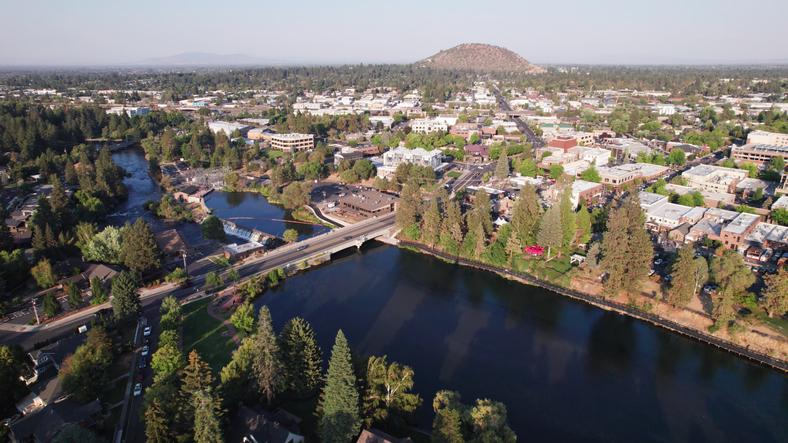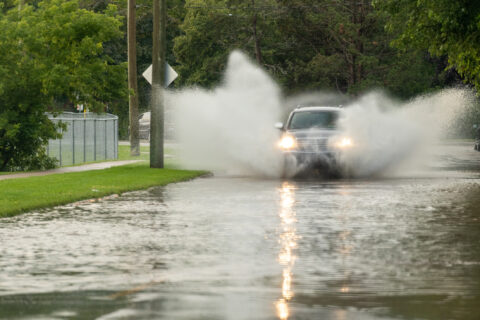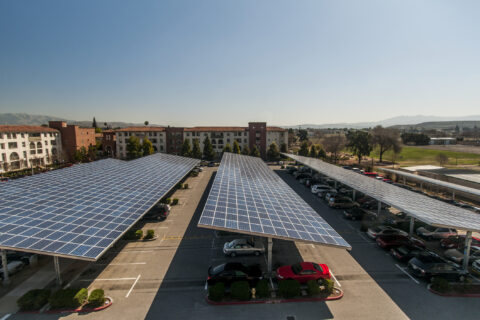Written in collaboration with Sarah Hutson, Russell Grayson and Garrett Sabourin of the City of Bend, Oregon.
The City of Bend, OR (population approximately 102,000), has won four infrastructure grants from the Bipartisan Infrastructure Law (BIL, officially known as the Infrastructure Investments and Jobs Act). Bend’s four federal grants include a Railroad Crossing Elimination Grant, a WaterSMART grant, a Rebuilding American Infrastructure with Sustainability and Equity (RAISE) grant, and an Airport Infrastructure Grant. To achieve this feat, the City of Bend did several things that other municipalities can follow to find success.
Focus as a Community on One Project
There were several catalysts for why Bend needed additional funding, but the city and community together focused on one project narrative when seeking grants. Bend, like many communities, is projected to grow by 50 percent over the next 20 years so with that rapid population growth they knew they needed to expand their infrastructure to meet this demand. Step one was to figure out what and where the need was in the city. This information was primarily compiled in Bend’s Transportation System plan, adopted in 2020, which recognized that approximately one billion dollars of investment was needed over the next twenty years to improve and maintain transportation infrastructure in the city.
Since The Great Recession, the city has invested approximately $1 billion in infrastructure investments – across drinking water, sewer, stormwater, and transportation. Most of that funding was raised from the local community – prior General Obligation Bonds, System Development Charges, or via increased utility rates. With a fast-growing community, critical infrastructure needs, and new opportunities that arose as a result of the federal Infrastructure Investment and Jobs Act (IIJA), the city made aggressively tracking and pursuing grant opportunities a major priority.
One of the priorities for securing grant funding was the construction of the Hawthorne Pedestrian & Bicyclist Overcrossing, for which the city sought and won $25 million in federal funding through the RAISE grant program. The Hawthorne Overcrossing project will connect downtown Bend with the emerging and growing Bend Central District by constructing a new bike/pedestrian bridge that crosses US 97 and BNSF railroad, creating a safe route for people to cross between east and west Bend. Residents in this part of the city are three times more likely to experience poverty, two times as likely to be a minority and more likely to live with a disability. The Bend Central District is a mixed-used area of the city that is expected to bring in $250 million in private development. The project will ultimately help connect equitable housing and transportation options to marginalized and underserved community members, while also increasing health outcomes and reducing emissions by encouraging walking and biking.

The Hawthorne project became the focus and rallying cry for the entire city. City staff and council brought together community partners to unite them to prioritize this project. City leadership also used the opportunity of bringing the community together to ensure that whenever anyone was talking to outside partners that everyone from the city and community of Bend was consistent in using and referencing the information. City leadership also took this messaging to Washington, by meeting with federal officials to explain the local impact of the project. Making sure that everyone was on the same page allowed messaging to be clear and transparent when the city and community pursued all available state and federal funding opportunities.
Find Local Revenue Support to Unlock Federal Funds
While some 100% grants exist for disadvantaged communities, most federal grants cover 80-90% of a project, but they require a local match so communities generally need to show they can contribute 10-20% of the total project costs when they submit their applications. Given the significant funding needed to support the vision of Bend’s transportation system into the future, the Transportation System Plan included a comprehensive funding and implementation plan, which identified a General Obligation Bond as a key funding tool. This paved the way for city leadership and the community to request the approval of a $190 million bond from resident voters, and the bond was approved by favorable vote on November 3, 2020. Bond-funded projects only include those that can be completed during the 10-year life of the bond and will be monitored, tracked and reported to the community by their Transportation Bond Oversight Committee. Residents can also view bond project updates through the Go Bond Dashboard. The bond would be repaid by a levy averaging 47 cents per $1,000 of assessed property value each year of the repairment period. Using the citywide average of assessed real property the typical homeowner will pay an average of $170 per year over the repayment period. The City was able to leverage GO Bond funding toward their required contribution for their federal grant applications.
Align Your Municipal Government to Work Together
With the city council aligned in securing funding sources for grants that would allow Bend to grow, it was up to city staff to identify, apply and implement different sources of funding. To help in this process the City Manager’s Office hosted monthly meetings to discuss funding opportunities that were available to Bend, and which ones aligned with priority projects. Once identified, city staff discussed and vetted further at standing weekly inter-departmental operations meetings. While these meetings are not always grant specific, they allow for collaboration and ensure everyone is rowing in the same direction once grants are officially announced through Notices of Funding Opportunity (NOFO) – which tend to have short deadlines around three months. These meetings strengthen relationships among city staff which has proven to be a significant asset to successful grant awards.
Practice Persistence for Success
“If at first you don’t succeed try, try again,” is a true adage with federal grant applications. Many cities are successful after their first application rather than on the first try. The City of Bend recognized that BIL funding would last for five years and immediately set out to see what funding opportunities were available to align with projects they wanted to complete. They set a goal of applying in the first rounds of funding because even if they didn’t win in the first round, they could receive feedback from federal agencies and apply again in the next several rounds of funding. This strategy proved to be useful, as Bend applied for a Reconnecting Communities Pilot grant and didn’t receive an initial award. They also submitted a RAISE grant, which they ended up winning. Both avenues provided useful to their ultimate grant success.
City staff in Bend shared that they hope all this success will allow them to continue to apply for state and federal grants to meet their growing community demands and needs outside of just transportation. They also shared that it helps to be “scrappy” for your community and look for any and every opportunity to share what your community is doing to help residents.
Find Your Grant Opportunity
Three of the four recent Bend grants are from U.S. Department of Transportation (USDOT). Cities, towns and villages of all sizes are applying and successfully receiving federal transportation grants from the USDOT. See other communities that have already won awards here. Learn more about the federal grant making process here, and find out the upcoming available grants here. Additionally, technical assistance and resources to answer many of your question about the federal process are available here.










